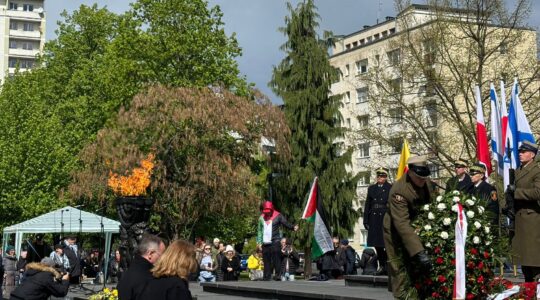ST. PETERSBURG, RUSSIA (JTA) – When Rabbi Stas Wojciechowicz blows the shofar this Rosh Hashanah, its distinctive sound won’t just be ringing in a new year, it will be ushering in a new era for the Progressive movement in the former Soviet Union.
By the end of the secular year, he hopes to be holding services in St. Petersburg’s Sha’arei Shalom Synagogue, the movement’s first community-owned synagogue among some 21 Progressive congregations in Russia.
For Wojciechowicz, that day can’t come soon enough.
“As soon as you have your own space, you are a king,” said the 30-year-old rabbi, newly arrived in St. Petersburg after his recent ordination from Hebrew Union College in Jerusalem.
Indeed, for the former Soviet Union’s languishing Reform movement, a synagogue fit for a king would be a welcome addition, and a kingly shul is just what they will be getting.
OROSIR, the Russian branch of the World Union for Progressive Judaism, purchased the prime downtown space, an apartment building constructed in Stalin’s time for Soviet naval admirals. The funds were donated by the West London Synagogue, where the community’s recently departed Rabbi Michael Farbman once spent five years as assistant rabbi.
Farbman left Russia in June for a new posting in the United States, but the community he built is moving ahead at full steam to get the building up and running.
An high-profile dedication ceremony was held on June 8, attended by Israeli and local dignitaries.
The 5,000-square-meter facility will include a children’s center decked out with plasma screen televisions, a day school and a youth club, illustrating just how much importance Sha’arei Shalom places on adding young congregants to its flagging rolls.
“It’s very important,” said Wojciechowicz, “that the children have a place that they feel is their own.”
Sha’arei Shalom’s executive director, Yuri Podolny, told JTA that the plan is first to open the second floor, which houses the kindergarten, followed shortly thereafter by the remaining areas.
Until that time, the congregation will continue meeting in its current location – an office space at Yesod, the city’s new Jewish community center operated by the American Jewish Joint Distribution Committee.
A native of Uzbekistan who made aliyah along with his mother in his early teens, Wojciechowicz was effusive about the benefits the community has enjoyed during its time in Yesod, chief among them the increased foot traffic and the high quality of the building’s facilities.
He complained, however, about the cumbersome bureaucratic process involved in requesting rooms for events, and expressed security concerns, especially ensuring that their Torahs are kept safe.
Wojciechowicz hopes that the months the congregation spent at Yesod will translate into greater attendance when they move into their new space.
On a recent Friday evening, the room was packed for Shabbat services, with an eclectic group of at least 45 people – an impressive number for any synagogue in the former Soviet Union, where it’s usually a struggle to bring in bodies on Shabbat.
Reform leaders and members of the city’sProgressive community hope that the new synagogue and its passionate young rabbi will portend a sea change for post-Soviet Jewry.
Studies have shown that most post-Soviet Jews are profoundly secular, owing to the long-term effects of communism’s state-enforced atheism. But the Reform movement has, for many reasons, struggled to gain a foothold in a region dominated by Chabad.
Sha’arei Shalom has only about 300 congregants, out of the estimated 70,000 to 100,000 Jews in Russia’s second largest city. The main goal in building the new synagogue is to increase that number.
Wojciechowicz and others have big plans, including a Limmud, or intensive study seminar, for Russian children. Whether all their plans will come to fruition is impossible to know, but his eyes shine brightly when he talks about the future for Judaism here.
“People here are grasping for God,” said Wojciechowicz. “They want to get to him, but they don’t know the way.”





